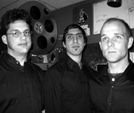 |

Comment
on this story
What:
Devil Music Ensemble w/ Belly Dancers of Gypsy Hands
When:
Saturday, May 8, 10 p.m.
Where:
Pilot Light
Cost:
$5
|
Found Sound
Devil Music Ensemble gives new resonance to silent films
by Paige M. Travis
Although films didn’t have projected soundtracks until the late ’20s, the cinema experience of that era wasn’t a silent affair. In most movie houses a pianist or organist played along with the picture, while the more elaborate movie palaces—like the great Strand and Roxy theaters in New York City—had full orchestras perform (and for the most part improvise) musical accompaniment.
Finding their place in music history is Devil Music Ensemble, a trio of Boston musicians who score and perform soundtracks to silent films, some famous, some obscure.
Founded by guitarist Brendon Wood in 1999, DME is a rock band with an ambient, electronic sound that stands alone without a backsplash of flickering black-and-white images. But the combined effect is a multi-media experience unlike that of a band or movie alone. Their previous score-and-tour project in 2003 was with the 1919 horror film The Cabinet of Dr. Caligari, a fairly well-known example of German expressionism. They’re currently touring with Big Stakes, a 1922 Western starring J.B. Warner and Elinor Fair. Jonah Rapino, who plays electric violin and other instruments for DME, says the group purposely chose a Western, perhaps out of a desire to further live out their cowboy fantasies.
“One of our guises is as a country western band,” says Rapino, who studied classical music composition and theory in college. Wood has a music degree from the University of Massachusetts, and drummer/percussionist Tim Nylander attended music school and Harvard.
Research began with a bunch of videotapes of silent westerns. “We hated almost all of them,” he reports. Some films had really slow parts, or racist or misogynistic plot points. With its quick pace and humorous dialogue, Big Stakes rose above the rest.
The film is packed with plot: A gentleman from Texas tries to win a lovely Mexican girl from a rival general, but when she rejects him, he returns home to find his girlfriend there being intimidated by a Ku Klux Klan leader who doubts her purity.
“It’s from the ’20s, so it’s not the most liberal thing,” Rapino says. “But it explores race and gender more than anything we’d seen.”
DME’s take on the western soundtrack won’t be like any you’ve heard before. Their compositions employ tweaked-out electric guitars, lap steel, vintage analog synthesizers, traditional drums and surprising percussion. The horrific nature of The Cabinet of Dr. Calgari lent itself to haunting strings, creepy bells and a low-hum bass line. Even as the music matches and enhances the moving pictures, the tunes are more abstract, more avant garde than traditional Hollywood soundtracks. Plus, the live performance brings immediacy to the connection between movie and music.
In film, the soundtrack frequently operates to influence the viewer’s emotions. Rapino realizes that power and enjoys the ability to lead an audience’s emotional response to what’s on the screen.
“That’s one of the most fun parts,” he says. “We are controlling the mood and tempo. If there’s a chase scene, we’re getting the blood up by playing faster.” Or when the opportunity presents itself, the music can direct the viewer’s attention to something happening in the background.
This control also affects their performance. Unlike a modern movie soundtrack, which is inextricably linked to the film once the final print is made, DME can tweak its score before, during and after every performance as necessary. As with all live music, timing, improvisation and even the occasional mistake keep the experience fresh and exciting, for the audience as well as the players.
Being based in Boston affords Devil Music Ensemble a comfortable position in a progressive, cinema-oriented atmosphere. Audiences desire—maybe even expect—cultural experiences that are different or rare. But as DME travels across the country, venues and viewers are a mixed bag. The band is accustomed to the usual “drunken and boisterous crowd” at rock clubs, but there is a different audience at theaters and performance halls. Rapino recounts performing in a big art space in Baltimore. “We get this crowd that’s not going to a mall movie theater,” he says. “They’re more ready for something new and strange.”
But on another night their venue is a mall movie theater—Briarwood Mall in Michigan. “There’s a nail salon right there,” he recalls. But the audience, which can range in age from 12 to 80, is no less interested in what DME is doing. Some folks who might not normally listen to their kind of music—“atonal stuff” is how Rapino describes parts of the Caligari soundtrack—have purchased a CD after the show.
“That’s amazing,” Rapino says. “That doesn’t happen when you’re playing just bars.”

May 6, 2004 • Vol. 14, No. 19
© 2004 Metro Pulse
|
|